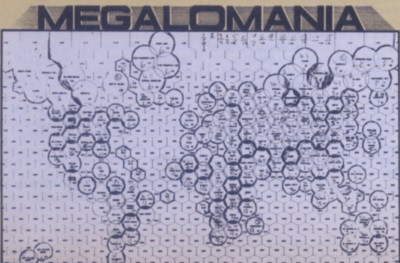


PBM mailman BRENDON KAVANAGH gets Megalomaniac with the game of world domination — PLUS expert tips from one who’s seen empires come and go
Megalomania is a strategy wargame which I’ve been trying to play for some time — and finally I understand it!
It’s a fixed-turnaround game for a small number of players set on a world map (OUR world, with minor alterations) of 154 countries and 355 seas.
At the start of the game each player is given a country and a budget of Treasury Bills to spend on industries, armies and navies as well as further countries. The first few turns are used for players to settle into the feel of the game (it took me ages) as they expand their little empires.
By the second turn, I found, the players were getting under the others’ feet, and since then Megalomania has been a blur of battles, alliances, defeats, and the odd victory.
The basis of Megalomania is simple, but I couldn’t attempt to explain the rules and full scenario in detail — it’s pretty involved!
Megalomania brings out the beast in people, once the unfriendly rulebook has been defeated. It’s pure strategy/diplomacy, with the necessary touch of economics as a colouring. And because of the heavy diplomacy involved, it’s very expensive — all diplomacy is done by telephone. (If you live with parents, I’d recommend you log your calls in preparation for THE BILL!) But startup, including three free turns, is only £6, and each turn thereafter is £1.50.
And it’s good fast-moving fun: double-crossing, double-dealing, sometimes agreeing, making deals, bribing (often mixed with double-crossing) and so on.
A WORD OF WARNING — dropouts ruin Megalomania, so ask for full details before you subscribe and be prepared for a pretty fierce game. It’s war.
That’s all I can say about it; the tips and turn map in this section might give you a better idea of Megalomania.
If interested, send an SAE or startup fee to Phoenix Games.

Above all else, Megalomania is a game of psychology: outguessing the enemies in military tactics and outthinking them in diplomatic strategy is the essence of it.
Start by putting yourself in your opponent’s shoes; identify their problems, visualise their opportunities. Most importantly, see yourself from their eyes. Only with this perspective can you protect your domain from their predations while conserving your forces for your own attack.
Study your enemies’ war plans, to learn their ploys and gain insight into their weaknesses. Analyse your enemies’ enemies, who could become your allies — or join with your foes against you. The world is round: no matter how far away a player appears to be what he does may affect you. Anticipate.
Study the rules carefully — Megalomania is cruel to those who make mistakes, and the ramifications of the rulebook aren’t easy to understand at first reading. You can’t understand your enemy unless you know all that he can do.
Action begins with the Set-Up, which is the process of selecting the Countries and Forces to supplement the Homeland allocated to you. It’s essential to have a clear strategy in mind, even at this early stage. There are three basic approaches:
Avoid buying Industries or Navies at Set-Up, as they curtail your purchasing power to no advantage — you can always build them up at the start of Round One. Your goal should be to maximise your revenue potential (not only for the next round): in the short term Country Taxes are efficient, but in the long run Commercial Revenues are most productive.
As the game develops, the pressure from your neighbours will increase. Remember that this works both ways, and that offence is the best defence. But aggression is expensive, and you can weaken yourself by overextending your resources. Above all, avoid the fatal error of separating your Tyrant from your reinforcements.
The object in Megalomania is to subdue your opponents by capturing their Tyrants. They then become your Vassals, reinforcing your defences (by acting as a barrier) and strengthening your offensives (by attacking your enemies).
But if you’re defeated and become a Vassal, your opportunities are restricted — so never give in too easily, unless you can obtain some real benefit (such as survival!).
Winning is simple — just outplay everyone else. Never make mistakes, and choose your opportunities; in negotiations, don’t reveal your plans (secrecy is invaluable!), but do establish credibility (which means don’t double-cross, except when it’s worthwhile); in warmongering, avoid fighting on more than one front; in alliances, ensure that there is mutuality of interests, and then you need neither betray nor trust; above all, think WIN. Easy, really.
One final point: there is no luck in Megalomania. (Even Sabotage distributions, the only random element, are sufficiently frequent to ensure overall evenhandedness.) There is only endless opportunity. If you do well in this game, you’re proving you’ve got what it takes.
And if you are a winner, I just hope you never have occasion to demonstrate your talents for real.
This month introduces regular READERS’ REVIEWS of PBM games, the first victim being Jade Games’s Shattered World. Following the sad demise of Arcadia (I still receive mail praising it!), we’re all wondering: is Shattered World as good?
Shattered World is a computer-moderated, sci-fi deadline game, set in a world which has been put through turmoil by the gravitational forces of a rogue asteroid. 20 players act as the surviving commanders of Tentraliths (big mobile things) waging war over the hexagon-based map.
Pretty pointless, yes, but that’s politics for you. Still, let’s see what our two reader/reviewers think...
Shattered World has an interesting scenario, nicely written in the rather good rulebook. Each of the 20 players has control of a Tentralith and must acquire crystals using mining units, while using scout walkers for combat purposes. The crystals (Promethite) are used to supply power for the game’s entities. Other such mobile units (which the player moves about the landscape) include girotanks, built by updating scout walkers from the hulk of old predisaster tanks which can sometimes be found rusting undisturbed, minelayers (which go about laying minefields). and minesweepers (which go about cleaning up after minelayers — logical).
I reckon there’s a lot in the game to enjoy. Planning and mapping are important and there’ll be a lot of units to control after a while. Diplomacy may not be important in the short term, but it should be considered for long-term survival.
I haven’t played in Shattered World long enough to say whether I like it or not. At this stage (four turns) I don’t find the game compelling, but cannot say why. I’ll have to carry on and report when I have more to say.
The three-foot-by-two-foot map looks good on the wall but it seems a little large and unwieldy to use, so there’s also a smaller (A4) version. The rulebook is reasonably well-written but lacks some things which perhaps should be made clear — for example, winning conditions.
The first condition is obtaining the requisite number of points — and there is a second, but you’re not told what it is. There’s just a cryptic comment.
The other major problem with the rulebook is that it leaves out information about the cost in power crystals of each option.
On to the game proper... you begin with your Tentralith and some other units: later, units such as giro tanks and radar units can be found by exploring and mapping the land. The first objective is to get your scouts and mining units out looking for crystals.
The results sheet is reasonably well laid out, and you get all the information you need from your roving units out crystal/artefact/player-hunting.
My final grumble is with the orders sheet, which I find a little irritating. You must give the movement directions for all of your units (NE, E, SE, SW, W or NW, as the board is a hexed map) and after each space for the order is a note detailing the directions in which you may move. These are always the same, so it makes the orders sheets much longer than necessary.
‘Why not just leave a single note at the top of the orders form?’ I asked Tim, the GM. Tim replied that players still constantly try to move north and south even though they cannot...
Still, I shall continue exploring (no, I shan’t tell you who I am!) and see what goes on in the rest of the game. I’m especially curious about that second victory condition...

Two interesting reports there... it seems to be too early in the game for the testers to comment on anything more than minor points (I don’t really see any relevance to the number of compass points on the orders sheets to the play of the game!). If you’re interested in a Shattered World startup, write to Jade Games.
Setup is a mighty £5 (which includes two free turns), while further turns cost £1.50 each including post both ways.
And later this year in CRASH we’ll see what our two ANONs have to say about midgame play.
Dear Brendon
I can think of few more interesting and enjoyable ways of spending some time
than becoming involved in a game played by mail, corresponding with the
gamesmaster and other players. So for the last nine weeks, since reading your
column, I’ve been on a personal quest to become involved in a game
— four games, in fact, Starn II, Conquest, Nuclear Domination
and It’s A Crime!, all of which have received my startup
fee.
In these nine weeks of frustration and nail-biting anticipation, I have received only one reply, and that was to tell me that the game had no places available.
Is this typical of a hobby played by mail, or am I just unfortunate?
Michael Adams
You’re just unfortunate. Honest. Starn II I
can’t vouch for, but Unclear Domination (I love that rulebook)
and It’s A Crime! have large backlogs, while Conquest
has just had a change of owners and a revamp (more soon). Keep trying and keep
pestering them.
BK
Dear Brendon
I am a newcomer to PBM MAILBOX, and I’d like to ask you a few questions.
What exactly is PBM MAILBOX? What is DIPLOMATIC DIRECTORY used for? How do I
get in touch with a PBM game?
Ian Francis
Well, Ian, PBM MAILBOX is intended to bring you news and views of what’s going on in the world of play-by-mail gaming. PBMing is an old hobby which has become increasingly popular. Whereas you may play a strategy game against your trusty Speccy, in PBMing many people play against each other in the same game, through the postal system and over a much longer period of time.
The object of DIPLOMATIC DIRECTORY is to get players of a PBM game in touch with each other, and to help would-be players of a PBM game find out more about it from someone who’s already in it (if you follow me...).
To get in touch with a game, simply look out for its address in PBM MAILBOX
and send an SAE asking for details. You can but try.
BK
Dear Brendon
I always seem to be hearing of new games starting up — mainly through
your spot. But rarely do we get an address to write to for more information.
How about sometimes printing the addresses of some major PBM companies and the
games they run?
While I’ve got the pen handy I would like to raise a further point. We’ve all been hearing recently about the expanding PBM industry — I even noticed a small spot on the subject in a recent Sunday magazine. I believe this to be the result of the improved coverage of the hobby, rather than an upsurge in the quality of games available. Perhaps expansion is also due to the players encouraging their friends to join — who knows?
The trouble is, though, how do those who don’t read specialist
magazines find out about the hobby? Surely it’s about time the larger PBM
companies started advertising further afield.
Ian Hudson — CRASH Diplomat 11
In a way, Ian, you answered your first question with your second. If PBM MAILBOX started plugging games willy-nilly, it would be nothing more than free advertising for the company. Most of those mentioned have at least given reviewers a placing on one of their games — a much fairer system, methinks.
I agree, though, PBM companies SHOULD advertise more.
BK
Dear Brendon
Firstly, I would like to thank you for your MAILBOX; without it I
wouldn’t be enjoying the hobby.
At the moment I only play It’s A Crime! but I would like to move on.
What is Trolls Bottom like?
D R Hawkins
Players of Trolls Bottom seem to be enjoying the game immensely
— it’s scoring a very high average on the ratings. The game is
simple, fun, cheap and covered on last month’s MAILBOX!
BK
Another month of packed mailbags — sorry I never have room to get everyone in! Remember, there’s always next month. Send your letters, queries and DIPLOMATIC DIRECTORY to: PBM FORUM (marking the directory entries DIPLOMATIC DIRECTORY).
And even if the sun does shine this summer, I’ll be spending all day inside wading through your words...